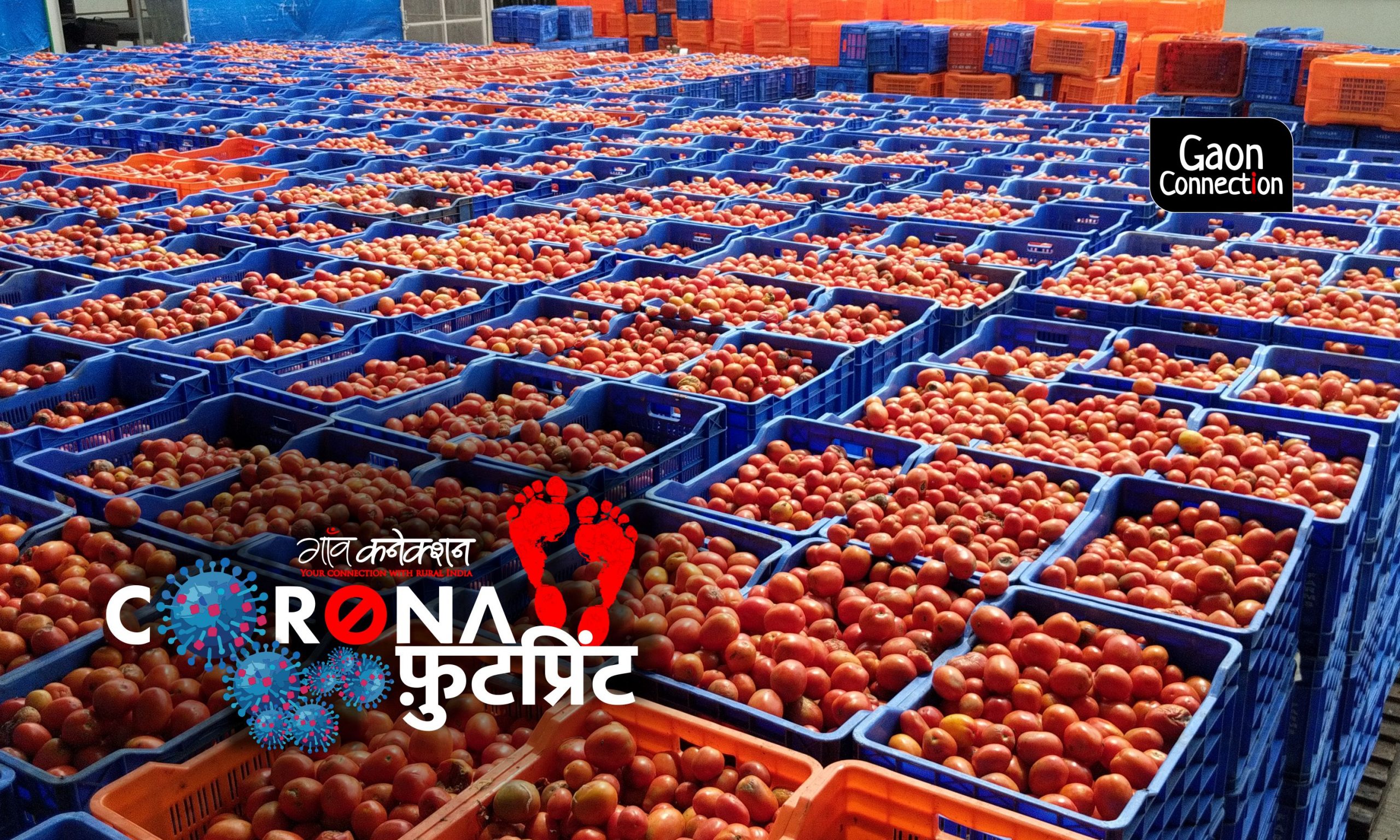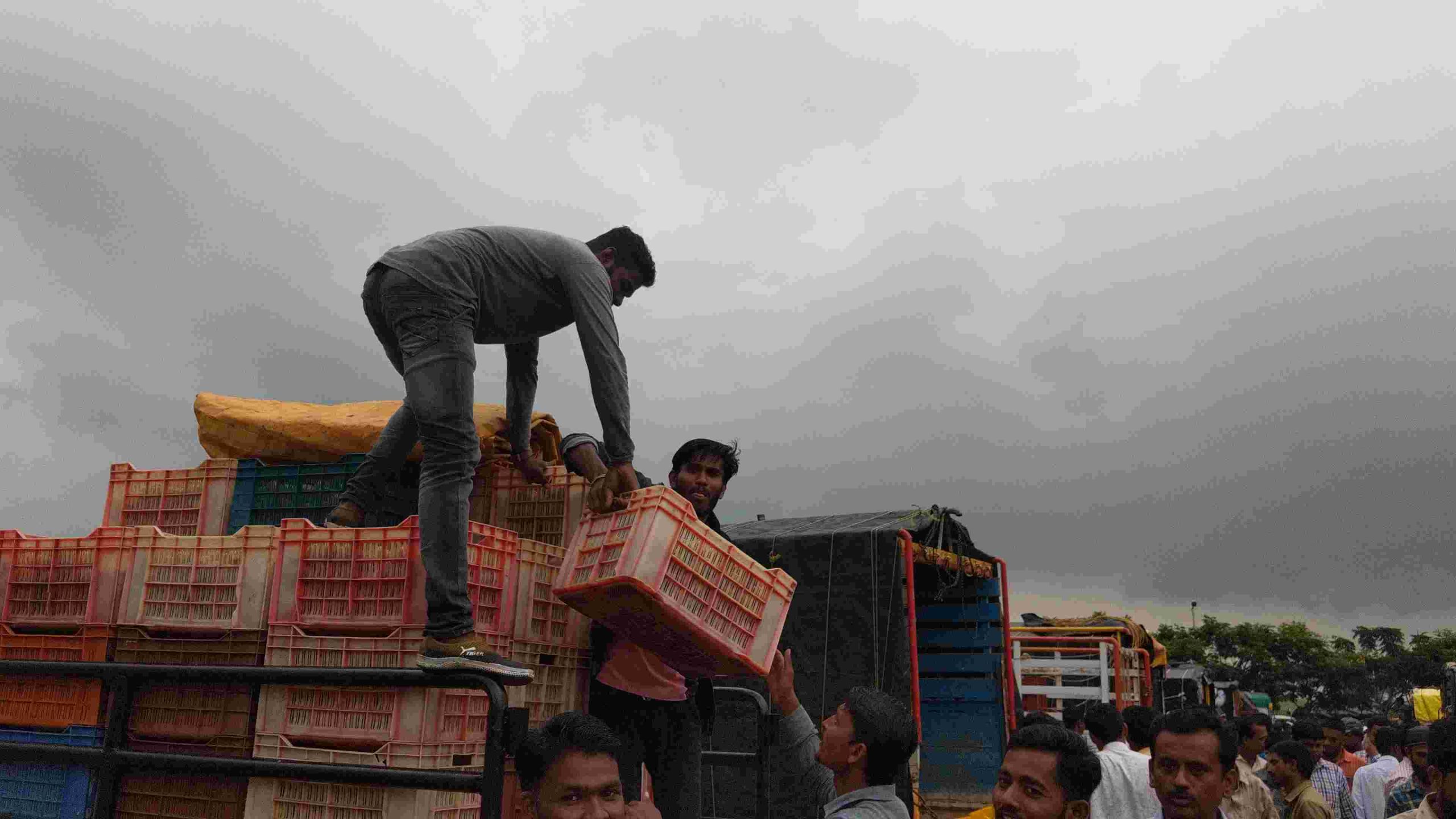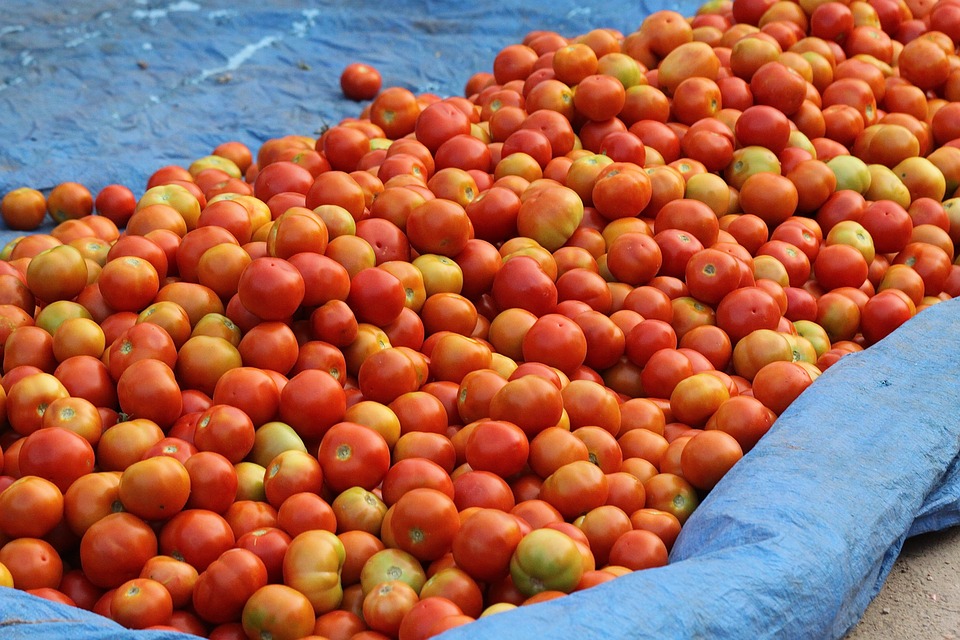Lockdown effect: At the vegetable mandis, tomatoes are selling at Re 1, onions for Rs 2 per kg
The prices have gone down because of the lesser number of retail buyers at the mandis. Besides, as all the hotels and dhabas are closed, the stock is arriving in the mandis, but not selling


In India, the wholesale prices of vegetables in the mandis have gone down considerably. In New Delhi, while tomatoes are selling at Rs 1-2 per kg, onions are selling at Rs 2-3 per kg. The prices of other vegetables have also gone down by 50 to 60 per cent.
At the Azadpur Mandi in New Delhi, tomatoes are selling for Re 1. On May 23, a farmer, angered at the low price, had dumped all his tomato in the mandi. The video went viral on social media.
Mohammad Arif, a vegetable trader at the Azadpur Mandi, told Gaon Connection over the phone: “The demand for vegetables has gone down. That is why the price of tomato has gone down to Re 1 per kg. The prices of other vegetables have gone down too.”
He added: “The wholesale price of torai (ridge gourd) is currently Rs 4-5 per kg which was Rs 12-13 per kg last month. Similarly, the price of lauki (bottle gourd) has come down from Rs 8-9 per kg to Rs 2-3 per kg. The price of onion has also gone down to Rs 2-3 per kg. The demand has been declining consistently. No one is there to buy tomatoes even at Rs 1-2 a kg. Every day lots of tomatoes are getting wasted. When we are not able to sell it ourselves, how will we buy?”
Madanpalli Mandi in the Chittur district of Andhra Pradesh is the second-largest tomato market in the country after Pipalgaon in Nashik, Maharashtra. Here also, the prices of tomatoes have fallen very fast.
Dadam Reddy, who cultivates tomatoes, told Gaon Connection over the phone: “The price of tomato has remained low this entire month. I sold five boxes of tomatoes on May 23 at Rs 80 per box. Last year, I had sold tomatoes at Rs 1,200- 2,000 per box. I have planted tomatoes in two acres. Since the lockdown, the rate has been very low. I must have suffered losses worth at least Rs 1.5 to 2 lakh so far.”
The box that Dadam was talking about usually contains 30 kg of tomatoes. Each box had fetched him Rs 80, which meant that tomatoes sold at Rs 2.50 per kg.

As per the central government’s website eNAM, which facilitates online purchase and sale to traders and farmers, the minimum wholesale price of tomato was Rs 240 per 100kgs and a maximum of Rs 560 per 100kgs on May 24 at the Madanpalli Mandi in Chittur district in Andhra Pradesh.
Raghu, the director of Raghu Farm Tomato, one of the largest vegetable vendors in Madanpalli Mandi, informed: “The demand from other cities has decreased. We had more demand for tomatoes in Delhi and Mumbai, but now that demand has gone down by less than half. Only the local demand is driving the market, but it does not get that good a price.”
As per the central government’s website, which monitors crop prices in mandis across the country, the price of tomatoes in mandis across the country averaged below Rs 5 per kg on May 24 while onion sold below Rs 6 per kg.
As per the website, the average price of tomato in the country was Rs 27.50 per kg on May 24 in 2019. The price of tomato has fallen in the mandis of Karnataka, Andhra Pradesh and Maharashtra, while onion prices have fallen drastically in the mandis of Maharashtra, Karnataka and Delhi.

In Madhya Pradesh, Sangram Singh, a resident of Mehndi village in Ratlam District, had cultivated onion this year. On May 6, when he visited the mandi to sell onions, he got a price of Re 1 per kg.
He told Gaon Connection over the phone: “For 2,338 kgs of onion, the trader paid me Rs 3,507 at the rate of Rs 1.50 per kg. I had spent more than that to go to the mandi. I have more onions to sell which I am holding back as I am waiting for the price to improve.”
The consumption of potato, onion and tomato in vegetables is the highest in the country, but every year their prices trouble both, the farmers, and the consumers. The price of onion had reached Rs 100 per kg in November-December 2019.
The central government had launched Operation Greens (top scheme) two years ago to protect the farmers from the falling prices of tomato, onion and potato.
Prime Minister Narendra Modi on May 12 had announced a relief package of Rs 20,000 lakh crore to bail the country out from lockdown losses. A provision of Rs 500 crore has been made for the Operation Greens programme and all the vegetables have now been brought under its ambit.

Ramesh Chand, a NITI Aayog member and an adviser to the central government, told PTI: “Farmers are being forced to sell their produce at low prices. It is a matter of grave concern. The prices of vegetables are also declining because there are more arrivals in the mandis than the corresponding consumption. The state governments should pay attention so that the farmers do not suffer.”
He added: “At the beginning of the lockdown, we had suggested the states that they close the mandis for up to six months so that the farmers could sell their produce directly, but it could not be done.”
However, agriculture economist and commodity affairs expert Vijay Sardana, told Gaon Connection over the phone: “If the farmers are not getting the right price at the mandi, they should not go to the mandis. The farmers will now have to become farmers as well as businessmen.”
Rajendra Sharma, the chairman of the Onion Merchant Association and a trader at the New Azadpur Mandi, told Gaon Connection: “The price of vegetables, including tomatoes, has gone down by 50 to 60 per cent due to lesser number of buyers in the mandi. All the hotels, dhabas etc, are closed, but arrivals in the mandi are on, while the consumption has gone down substantially. A large number of people have already left the city too. It has also affected vegetable prices. Many corona patients were also found in the mandis, so people are not coming to mandi due to fear.”
He added: “For all these reasons, the price of vegetables is falling. With the rise in the temperature, if the demand does not rise, the price will fall further. However, the price of retail markets vegetables is stable. It is not giving any relief to the common people.”

